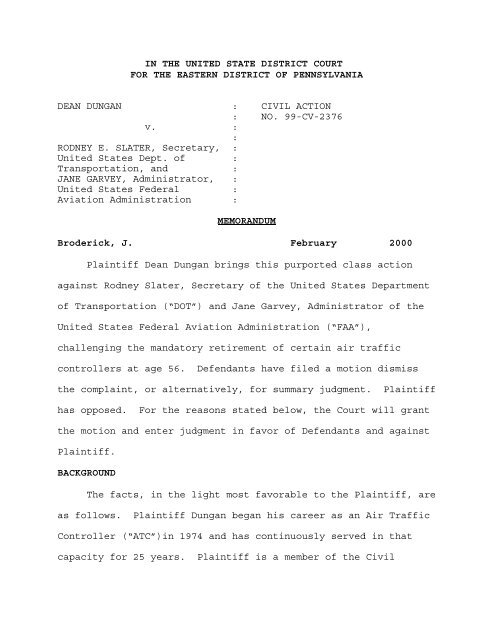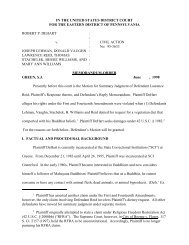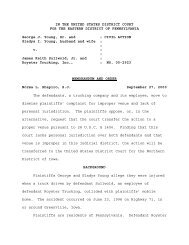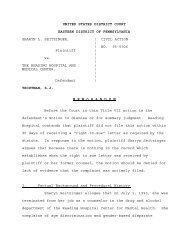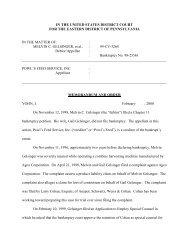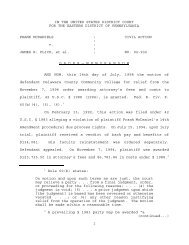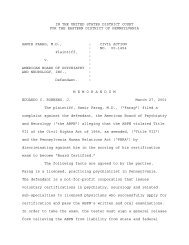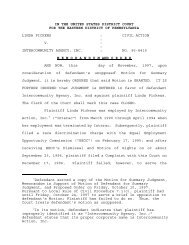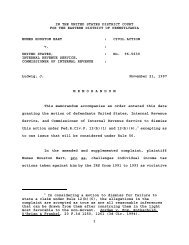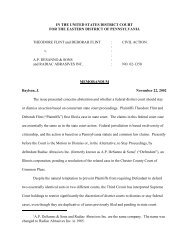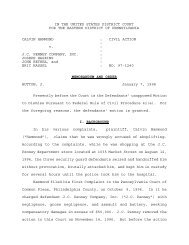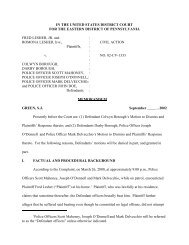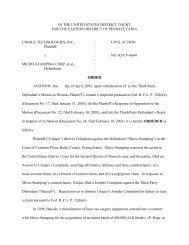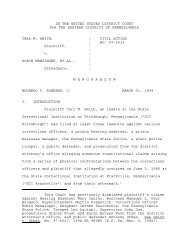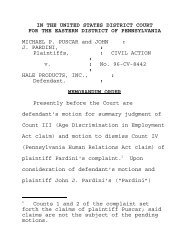Dean dungan - Eastern District of Pennsylvania
Dean dungan - Eastern District of Pennsylvania
Dean dungan - Eastern District of Pennsylvania
Create successful ePaper yourself
Turn your PDF publications into a flip-book with our unique Google optimized e-Paper software.
IN THE UNITED STATE DISTRICT COURT<br />
FOR THE EASTERN DISTRICT OF PENNSYLVANIA<br />
DEAN DUNGAN : CIVIL ACTION<br />
: NO. 99-CV-2376<br />
v. :<br />
:<br />
RODNEY E. SLATER, Secretary, :<br />
United States Dept. <strong>of</strong> :<br />
Transportation, and :<br />
JANE GARVEY, Administrator, :<br />
United States Federal :<br />
Aviation Administration :<br />
MEMORANDUM<br />
Broderick, J. February 2000<br />
Plaintiff <strong>Dean</strong> Dungan brings this purported class action<br />
against Rodney Slater, Secretary <strong>of</strong> the United States Department<br />
<strong>of</strong> Transportation (“DOT”) and Jane Garvey, Administrator <strong>of</strong> the<br />
United States Federal Aviation Administration (“FAA”),<br />
challenging the mandatory retirement <strong>of</strong> certain air traffic<br />
controllers at age 56. Defendants have filed a motion dismiss<br />
the complaint, or alternatively, for summary judgment. Plaintiff<br />
has opposed. For the reasons stated below, the Court will grant<br />
the motion and enter judgment in favor <strong>of</strong> Defendants and against<br />
Plaintiff.<br />
BACKGROUND<br />
The facts, in the light most favorable to the Plaintiff, are<br />
as follows. Plaintiff Dungan began his career as an Air Traffic<br />
Controller (“ATC”)in 1974 and has continuously served in that<br />
capacity for 25 years. Plaintiff is a member <strong>of</strong> the Civil
Service Retirement System, (“CSRS”), a pension plan that provides<br />
benefits to many retired civil service employees who began their<br />
careers between 1972 and 1987. Unless the Secretary <strong>of</strong> the DOT<br />
exempts an ATC from automatic separation, Congress requires that<br />
such individuals be forced to retire from so-called “covered”<br />
positions on the last day <strong>of</strong> the month in which the ATC becomes<br />
56 years <strong>of</strong> age. 5 U.S.C. § 8335.<br />
Plaintiff will reach age 56 in March <strong>of</strong> 2000. On June 15,<br />
1998, Plaintiff wrote a memorandum to his air traffic division<br />
manager, requesting a waiver <strong>of</strong> the age 56 retirement rule. See<br />
Complaint, Exhibit A. (Docket No. 1). By memorandum dated August<br />
25, 1998, Plaintiff Dungan’s request was denied by regional<br />
manager Franklin D. Hatfield. See Complaint, Exhibit B.<br />
Specifically, the memorandum restated the FAA’s 1995 policy that<br />
“for the foreseeable future we do not believe circumstances<br />
warrant elevating requests for waivers to the Administration.”<br />
See Complaint, Exhibits B and C.<br />
In 1981, thousands <strong>of</strong> Pr<strong>of</strong>essional Air Traffic Controllers<br />
(“PATCO Controllers”) conducted a strike against the federal<br />
government. President Reagan fired them and barred them from<br />
working in any position within the FAA. On August 12, 1993,<br />
President Clinton repealed the bar against employing former<br />
striking PATCO controllers within the FAA. See Presidential<br />
Memorandum (August 12, 1993). Currently, PATCO controllers who<br />
2
were barred from employment with FAA solely as a result <strong>of</strong> their<br />
participation in the 1981 strike can be considered for employment<br />
and hired by the FAA.<br />
Plaintiff did not strike in 1981. Plaintiff contends that<br />
the FAA and DOT are forcing him to retire at age 56 while<br />
permitting air traffic controllers who were barred from FAA<br />
employment during the Reagan Administration and later rehired<br />
during the Clinton Administration to continue employment past age<br />
56 until they reach 20 years <strong>of</strong> service, all in violation <strong>of</strong> the<br />
Age Discrimination in Employment Act (“ADEA”), 29 U.S.C. §§ 631<br />
et. seq. Moreover, Plaintiff contends that the FAA and DOT’s<br />
refusal to grant him a waiver <strong>of</strong> the mandatory retirement statute<br />
is a violation <strong>of</strong> the Due Process and Equal Protection clauses<br />
<strong>of</strong> the United States Constitution.<br />
STATUTORY BACKGROUND<br />
The act which mandates that Plaintiff retire at age 56 was<br />
passed in 1972. Congress enacted Public Law 92-297 (codified at<br />
5 U.S.C. § 8335) as part <strong>of</strong> a broad program to benefit ATCs.<br />
According to the Senate Committee Report, the purpose <strong>of</strong> the law<br />
is:<br />
to improve the conditions <strong>of</strong> employment for individuals<br />
employed as air traffic controllers in the Department<br />
<strong>of</strong> Transportation by <strong>of</strong>fering preferential retirement<br />
benefits, job training and improved appeal procedures<br />
for controllers removed from control work, and the<br />
establishment <strong>of</strong> maximum recruitment and retention ages<br />
for controllers.<br />
S. Rep. No. 92-774(1972), reprinted in 1972 U.S.C.C.A.N. 2287.<br />
3
As justification for the law, the Report noted that:<br />
For several years, both the executive and legislative<br />
branches have recognized that employees <strong>of</strong> the Federal<br />
Government who are engaged in the separation and<br />
control <strong>of</strong> aircraft at airport towers and in regional<br />
radar control centers occupy positions requiring<br />
precise skills upon which aviation safety depend and<br />
taxing heavily the physical and mental strength <strong>of</strong> the<br />
individuals involved. . . . Although there are several<br />
groups <strong>of</strong> employees in the Government whose employment<br />
is hazardous . . . air traffic controllers are unique<br />
in that their work involves both physical and mental<br />
strain for the controller, and the safety <strong>of</strong> the public<br />
traveling by air.<br />
Id. The law separated ATCs from the “normal retirement<br />
requirements” <strong>of</strong> the civil service system and <strong>of</strong>fered a<br />
“preferential system.” Id. at 2289. While recognizing “that<br />
selecting air traffic controllers for preferential retirement<br />
treatment constitutes a significant change <strong>of</strong> policy for the<br />
civil service retirement system,” the Senate Report concluded<br />
that “the unique employment <strong>of</strong> these employees justifies such a<br />
system.” Id.<br />
The statute was codified at 5 U.S.C. § 8335. It includes a<br />
mandatory separation provision, which states:<br />
An air traffic controller shall be separated from the<br />
service on the last day <strong>of</strong> the month in which he<br />
becomes 56 years <strong>of</strong> age. The Secretary, under such<br />
regulations as he may prescribe, may exempt a<br />
controller having exceptional skills and experience as<br />
a controller from the automatic separation provisions<br />
<strong>of</strong> this subsection until that controller becomes 61<br />
years <strong>of</strong> age. The Secretary shall notify the<br />
controller in writing <strong>of</strong> the date <strong>of</strong> separation at<br />
least 60 days before that date. Action to separate the<br />
controller is not effective, without the consent <strong>of</strong> the<br />
controller, until the last day <strong>of</strong> the month in which<br />
4
the 60-day notice expires.<br />
5 U.S.C. § 8335(a).<br />
In 1987, Congress radically amended the pension benefits<br />
available to federal employees generally, and ATCs specifically,<br />
by enacting the Federal Employees’ Retirement System (“FERS").<br />
Thus, ATCs hired after 1987, including many rehired PATCO<br />
controllers, are covered under FERS. An ATC's retirement and<br />
pension plans differ significantly depending on whether the ATC<br />
is covered by CSRS or FERS. Under FERS, an ATC must retire at<br />
age 56 or upon completion <strong>of</strong> 20 years <strong>of</strong> service in a covered<br />
position, whichever comes later. See 5 U.S.C. § 8425.<br />
LEGAL STANDARD<br />
Defendants have filed a motion “to Dismiss the Complaint, or<br />
alternatively, for Summary Judgment.” 1 Because the Court will<br />
consider “matters outside the pleading,” the motion shall be<br />
treated as one for summary judgment. See Fed.R.Civ.P. 12(b).<br />
A court may grant summary judgment “if the pleadings,<br />
depositions, answers to interrogatories, and admissions on file,<br />
together with the affidavits, if any, show that there is no<br />
genuine issue as to any material fact and that the moving party<br />
is entitled to a judgment as a matter <strong>of</strong> law.” Fed.R.Civ.P.<br />
56(c). In response to a motion for summary judgment, the non-<br />
1<br />
Alternatively, the Defendants move for dismissal or<br />
transfer for lack <strong>of</strong> venue. Given the disposition <strong>of</strong> the claims<br />
on summary judgment, that portion <strong>of</strong> the motion is moot.<br />
5
moving party must “set forth specific facts showing that there is<br />
a genuine issue for trial.” Fed.R.Civ.P. 56(e); see Celotex v.<br />
Catrett, 477 U.S. 317, 322-24 (1986). In doing so, the nonmoving<br />
party must “do more than simply show that there is some<br />
metaphysical doubt as to the material facts.” Matsushita Elec.<br />
Indus. Co. v. Zenith Radio Corp., 475 U.S. 574, 586 (1986).<br />
When deciding a motion for summary judgment, a court must<br />
draw all justifiable inferences in favor <strong>of</strong> the non-moving party.<br />
See Anderson v. Liberty Lobby, Inc., 477 U.S. 242, 255 (1986). A<br />
genuine issue <strong>of</strong> material fact exists only when “the evidence is<br />
such that a reasonable jury could return a verdict for the nonmoving<br />
party.” Id. at 248.<br />
If the evidence <strong>of</strong> the non-moving<br />
party is “merely colorable,” or is “not significantly probative,”<br />
and the moving party is entitled to judgment as a matter <strong>of</strong> law,<br />
summary judgment may be granted. Id. at 249-50.<br />
ANALYSIS<br />
Counts I and II<br />
In Count I <strong>of</strong> his Complaint, Plaintiff contends that<br />
Defendant Rodney Slater, in his capacity as Secretary <strong>of</strong> the DOT,<br />
violated the provisions <strong>of</strong> the Age Discrimination in Employment<br />
Act (“ADEA”) in requiring Plaintiff Dungan, an Air Traffic<br />
Control Specialist Supervisor, to retire at age 56, while<br />
allowing other Air Traffic Specialists similarly situated to<br />
continue to work beyond age 56. Plaintiff further contends that<br />
6
Air Traffic Tower Managers, Staff employees, Quality control<br />
employees and Flight Service Specialists do not have to retire at<br />
age 56.<br />
In his response to Defendant’s motion for summary judgment,<br />
Plaintiff contends that Defendant Rodney Slater violated the ADEA<br />
by forcing him to retire at age 56 while permitting rehired<br />
PATCOs to work past age 56, and have an opportunity to achieve 20<br />
years <strong>of</strong> service.<br />
In Count II, Plaintiff Dungan contends that Defendant Jane<br />
Garvey, in her capacity as administrator <strong>of</strong> the FAA, violated the<br />
ADEA by refusing to forward Plaintiff's waiver request to the<br />
Secretary <strong>of</strong> Transportation. As the analysis below demonstrates,<br />
Plaintiff has not raised a genuine issue <strong>of</strong> material fact, and<br />
Defendants are entitled to judgment as a matter <strong>of</strong> law because<br />
such actions are not violations <strong>of</strong> the ADEA.<br />
The language <strong>of</strong> the ADEA, as enacted in 1967, made it clear<br />
that the ADEA did not apply to the federal government. 29 U.S.C.<br />
§ 630(b). However, in 1978, Congress passed Amendments to the<br />
ADEA, which made the statute applicable to the federal<br />
government. See 29 U.S.C. § 633a(a). With respect to federal<br />
agencies, the ADEA now provides that “all personnel actions<br />
affecting employees . . . who are at least 40 years <strong>of</strong> age . . .<br />
in executive agencies as defined in section 105 <strong>of</strong> Title 5 . . .<br />
shall be made free from any discrimination based on age.” 29<br />
7
U.S.C. § 633a(a).<br />
Although the ADEA now applies to federal agencies, the 1978<br />
Amendments did not change several mandatory retirement provisions<br />
which existed in 1978, and continue to exist today.<br />
As the<br />
United States Supreme Court has explained, the “1978 Amendments<br />
eliminated substantially all federal age limits on employment,<br />
but they left untouched several mandatory retirement provisions<br />
<strong>of</strong> the federal civil service statue applicable to specific<br />
federal occupations, including firefighters, air traffic<br />
controllers, and law enforcement <strong>of</strong>ficers.” Johnson v. Mayor and<br />
City Council <strong>of</strong> Baltimore, et al., 472 U.S. 353, 357 (1985).<br />
While discussing the mandatory retirement provision for federal<br />
firefighters, the Supreme Court stated that “Congress, <strong>of</strong> course,<br />
may exempt federal employees from application <strong>of</strong> the ADEA, and<br />
otherwise treat federal employees, whose employment relations it<br />
may directly supervise, differently from those <strong>of</strong> other employers<br />
. . . indeed it has done so elsewhere in the ADEA.” Id. at 366<br />
n.10 (internal citations omitted). Thus, the Supreme Court has<br />
acknowledged that the ADEA does not apply to specific federal<br />
occupations with mandatory retirement provisions.<br />
This Court concludes that the mandatory separation statute<br />
codified at 5 U.S.C. § 8335(a) is an exception to the ADEA. See<br />
e.g., Strawberry v. Albright, 111 F.3d 943, 947 (D.C. Cir<br />
1997)(per curiam) (holding mandatory retirement <strong>of</strong> Foreign<br />
8
Service employees is exception to ADEA’s general prohibition <strong>of</strong><br />
age discrimination); Bowman v. United States Dept. <strong>of</strong> Justice,<br />
510 F.Supp 1183, 1186 (E.D.Va 1981), aff’d 679 F.2d 876 (4th Cir.<br />
1982), cert. denied 459 U.S. 1072 (1982)(holding section 8335(b)<br />
is an exception to ADEA). Plaintiff is an ATC who is<br />
specifically excluded from the coverage <strong>of</strong> the ADEA. Therefore,<br />
there is no genuine issue <strong>of</strong> material fact for trial, and, the<br />
ADEA having been held inapplicable, Defendant is entitled to<br />
judgment as a matter <strong>of</strong> law. The Court will enter judgment in<br />
favor <strong>of</strong> Defendants Slater and Garvey and against Plaintiff<br />
Dungan on Counts I and II.<br />
Count III<br />
Plaintiff Dungan contends that Rodney Slater, in his<br />
capacity as Secretary <strong>of</strong> DOT, violated Plaintiff's due process<br />
and equal protection rights. Plaintiff contends that the DOT<br />
policy <strong>of</strong> refusing to forward waiver requests to the Secretary<br />
violates his due process “right <strong>of</strong> federal employment.”<br />
In<br />
addition, Plaintiff contends that similarly situated employees,<br />
including those who were fired for having gone on strike in 1981<br />
and were subsequently rehired, are not forced to retire at age<br />
56.<br />
While Plaintiff has alleged violations <strong>of</strong> both the Fifth and<br />
Fourteenth Amendments, it is clear that the Fourteenth Amendment<br />
9
applies to state, not federal agents. See U.S. Const. amend. XIV<br />
§ 1. The United States Supreme Court has held “that the Due<br />
Process Clause <strong>of</strong> the Fifth Amendment forbids the Federal<br />
Government to deny equal protection <strong>of</strong> the laws.” Vance v.<br />
Bradley, 440 U.S. 93, 94 n.1 (1979). Therefore, Plaintiff’s<br />
claims will be analyzed under the Fifth Amendment.<br />
Due Process<br />
The Due Process Clause <strong>of</strong> the Fifth Amendment provides, in<br />
relevant part, “No person . . . shall be . . . deprived <strong>of</strong> life,<br />
liberty, or property, without due process <strong>of</strong> law . . . .” To<br />
pursue a due process violation, a plaintiff must first<br />
demonstrate that there has been a deprivation <strong>of</strong> a life, liberty<br />
or property interest. See Mathews v. Elderidge, 424 U.S. 319, 332<br />
(1976). After plaintiff makes this showing, the court must<br />
address the question <strong>of</strong> “how much process is due.” Cleveland<br />
Board <strong>of</strong> Education v. Loudermill, 470 U.S. 532, 541 (1985).<br />
Plaintiff contends that he has a property interest in<br />
continued public employment. “Property interests are not created<br />
by the Constitution, ‘they are created and their dimensions are<br />
defined by existing rules or understandings that stem from an<br />
independent source....’” Loudermill, 470 U.S. at 538, quoting<br />
Board <strong>of</strong> Regents v. Roth, 408 U.S. 564, 577 (1972). For example,<br />
the United States Supreme Court has held that a public college<br />
10
pr<strong>of</strong>essor dismissed from a position held under tenure provisions,<br />
Slochower v. Board <strong>of</strong> Education, 350 U.S. 551 (1956), and public<br />
college pr<strong>of</strong>essors and staff members dismissed during the term <strong>of</strong><br />
their contracts, Wieman v. Updegraff, 344 U.S. 183 (1952), have<br />
interests in continued employment that are safeguarded by due<br />
process. The Third Circuit has held that a tenured public school<br />
teacher, Bradley v. Pittsburgh Board <strong>of</strong> Ed., 913 F.2d 1064<br />
(1990), and a state employee who could not be terminated “except<br />
for just cause,” Perri v. Aytch, 724 F.2d 362 (1983), had<br />
property interests sufficient to trigger due process. To have a<br />
property interest in his continued public employment, Plaintiff<br />
must demonstrate “a legitimate claim <strong>of</strong> entitlement to it.”<br />
Roth, 564 U.S. at 577.<br />
In this case, Plaintiff cannot demonstrate “a legitimate<br />
claim <strong>of</strong> entitlement” to employment past age 56. Unlike the<br />
cases cited above, Plaintiff’s mandatory separation at age 56 has<br />
been an explicit term <strong>of</strong> his employment as an ATC. The mandatory<br />
retirement statute had been enacted over a year before Plaintiff<br />
began working for the FAA, and “[a]ll citizens are presumptively<br />
charged with knowledge <strong>of</strong> the law,” Atkins v. Parker, 472 U.S.<br />
115, 130 (1985). By his own admission, Plaintiff learned <strong>of</strong> the<br />
mandatory retirement provision in 1975, yet chose to remain with<br />
the FAA for at least 24 years. Plaintiff’s assertion <strong>of</strong> a<br />
property interest in public employment thus fails to demonstrate<br />
11
the requisite “deprivation” <strong>of</strong> a property interest to invoke the<br />
Due Process Clause. See Garrow v. Gramm, 856 F.2d 203 (D.C. Cir.<br />
1988).<br />
Nevertheless, Plaintiff contends that he is “entitled” to a<br />
waiver <strong>of</strong> the mandatory retirement provision, and “entitled” to<br />
have the Secretary consider his waiver request. However, the<br />
mandatory separation statute at issue states: “The Secretary,<br />
under such regulations as he may prescribe, may exempt a<br />
controller having exceptional skills and experience as a<br />
controller from the automatic separation provision <strong>of</strong> the<br />
subsection until that controller becomes 61 years <strong>of</strong> age.” 5<br />
U.S.C. § 8335(a). (emphasis added). Use <strong>of</strong> the term “may” in the<br />
statute indicates that the decision to grant a waiver is<br />
discretionary. See Dorris v. Absher, 179 F.3d 420, 429 (6th Cir.<br />
1999); Cedillo v. United States, 124 F.3d 1266, 1268 (Fed. Cir.<br />
1997). The plain language <strong>of</strong> the statute demonstrates that the<br />
Secretary is not required to exempt anyone from the statute. 2<br />
Moreover, the statute explicitly authorizes the Secretary to<br />
develop a procedure to determine when and how to exempt a<br />
controller from mandatory retirement. See 5 U.S.C. § 8335(a).<br />
2<br />
Even if the Secretary were to except an ATC from mandatory<br />
retirement, such exception “may be withdrawn at any time . . . .<br />
The [air traffic] controller does not acquire the right to work<br />
an additional full 5 years simply because the Secretary has<br />
granted an extension <strong>of</strong> service time to him.” S. Rep. No. 92-<br />
774(1972), reprinted in 1972 U.S.C.C.A.N. 2287, 2291.<br />
12
According to David Sprague, Program Director for Air Traffic<br />
Management, waivers from the mandatory separation provision must<br />
first be submitted to the facility manager for consideration.<br />
See Docket No. 8, Ex. 1. If the facility manager endorses the<br />
request, it is forwarded to the regional resource management<br />
branch. Id. If the waiver is endorsed at this level, it is<br />
forwarded to the regional manager, then forwarded up to the<br />
program director. Id. Only if the waiver has been endorsed at<br />
each level will it receive consideration from the Program<br />
Director. Id. However, the FAA has determined that present<br />
circumstances do not merit making any exemptions to the mandatory<br />
separation provision, and, since 1995, the FAA’s stated policy is<br />
that “for the foreseeable future we do not believe circumstances<br />
warrant elevating requests for waivers to the Administration.”<br />
Id.<br />
Plaintiff admits that “it is without question that Congress<br />
intended that the Secretary be granted complete authority with<br />
regard to exempting certain ATCs from the automatic separation<br />
provisions <strong>of</strong> this subsection. Further, Plaintiff does not<br />
dispute the fact that the Secretary is empowered to delegate this<br />
authority to the Administrator <strong>of</strong> the FAA.” See Docket No. 9 at<br />
17-18. Plaintiff contends that his due process rights were<br />
violated in that he never received specific information as to the<br />
13
FAA’s waiver procedure. 3 (See Docket No. 9 at 19.)<br />
This Court has already determined that Plaintiff did not<br />
have a legitimate claim <strong>of</strong> entitlement to employment past age 56<br />
and thus the Due Process Clause does not apply. See Loudermill,<br />
470 U.S. at 541. Assuming, arguendo, that the Due Process Clause<br />
does apply, and the Court must address the question <strong>of</strong> “how much<br />
process is due,” this Court finds that even if the Secretary <strong>of</strong><br />
DOT failed to provide specific information about the waiver<br />
process to Plaintiff, this oversight, and the subsequent denial<br />
<strong>of</strong> a waiver does not <strong>of</strong>fend Due Process.<br />
The Supreme Court has generally balanced three distinct<br />
factors to determine what process is constitutionally due: (1)<br />
the private interest that will be affected by the <strong>of</strong>ficial<br />
action; (2) the risk <strong>of</strong> an erroneous deprivation <strong>of</strong> such interest<br />
through the procedure used, and the probable value, if any, <strong>of</strong><br />
additional or substitute safeguards; and (3) the Government’s<br />
interest. Gilbert v. Homar, 520 U.S. 924, 931-32 (1997)(quoting<br />
Mathews v. Eldridge, 424 U.S. at 335).<br />
With respect to the first factor, private interest, this<br />
3 Of course, Plaintiff’s conduct undermines this contention.<br />
Neither party disputes that Plaintiff applied, nearly two years<br />
before his 56th birthday, for a waiver. See Docket No. 1 Exhibit<br />
A. His request for a waiver was denied. See Docket No. 2 Exhibit<br />
B. However, when deciding a motion for summary judgment, this<br />
Court does not make credibility determinations or weigh evidence,<br />
see Anderson, 477 U.S. at 254, and the Court will therefore<br />
assume that Plaintiff was kept “literally in the dark with regard<br />
to this procedure.” See Docket No. 9 at 19.<br />
14
Court has already explained that Plaintiff is not entitled to a<br />
waiver <strong>of</strong> mandatory separation under Section 8335. At most,<br />
Plaintiff is entitled to submit a waiver request.<br />
Notwithstanding his asserted lack <strong>of</strong> familiarity with the wavier<br />
procedures, Plaintiff appropriately submitted a request for a<br />
waiver to his manager. See Docket No. 1 Ex. A. Moreover,<br />
Plaintiff’s request for a waiver was not denied because he failed<br />
to comply with the procedure for requesting a waiver; it was<br />
denied because the FAA has determined that it does not need any<br />
ATCs eligible for mandatory retirement to extend their<br />
employment. See Docket No. 2 Ex. B. Thus the private interest<br />
is insubstantial.<br />
The second factor is the risk <strong>of</strong> erroneous deprivation and<br />
probable value <strong>of</strong> additional safeguards. Congress has<br />
authorized, but not compelled, the Secretary to grant exceptions<br />
to the mandatory retirement <strong>of</strong> covered ATCs. The mandatory<br />
retirement statute specifically outlines the procedure which must<br />
be followed before an ATC is retired:<br />
An air traffic controller shall be separated from the<br />
service on the last day <strong>of</strong> the month in which he<br />
becomes 56 years <strong>of</strong> age. . . . The Secretary shall<br />
notify the controller in writing <strong>of</strong> the date <strong>of</strong><br />
separation at least 60 days before that date. Action<br />
to separate the controller is not effective, without<br />
the consent <strong>of</strong> the controller, until the last day <strong>of</strong><br />
the month in which the 60-day notice expires.<br />
5 U.S.C. § 8335(a). Plaintiff has not alleged, nor is there any<br />
evidence, that the Secretary has failed to comply with these<br />
15
procedural requirements.<br />
Moreover, the DOT did not reject Plaintiff’s waiver request<br />
in a way that damaged his standing or associations in his<br />
community. “Where a person’s good name, reputation, honor, or<br />
integrity is at stake because <strong>of</strong> what the government is doing to<br />
him, notice and opportunity to be heard are essential.”<br />
Wisconsin v. Constantineau, 400 U.S. 433, 437 (1971). The denial<br />
from Air Traffic Manager Franklin Hatfield states: “While your<br />
credentials are indeed impressive, agency policy is that<br />
circumstances do not warrant elevating request for waivers to the<br />
Administrator.” Docket No. 1, Ex. B. Nor is Plaintiff barred<br />
from employment within the FAA. The Hatfield Memorandum states:<br />
“Placement into a non-covered position may be a viable<br />
alternative.” Id. Therefore, the Court finds that there is very<br />
little risk <strong>of</strong> erroneous deprivation, and there is no probable<br />
value <strong>of</strong> substitute procedural safeguards.<br />
Finally, the third factor, the Government’s interest, is<br />
quite substantial. The Secretary and the Administrator have an<br />
important interest in enforcing the mandatory separation statute<br />
as passed by Congress. As discussed earlier, the mandatory<br />
separation statute was passed by Congress as part <strong>of</strong> a<br />
preferential retirement program for ATCs. Congress authorized,<br />
but did not compel, the Secretary <strong>of</strong> DOT to grant limited<br />
exceptions to the mandatory retirement provision. The FAA has<br />
16
determined, in coordination with both the National Air Traffic<br />
Controllers Association and the National Association <strong>of</strong> Air<br />
Traffic Specialists, that for the foreseeable future,<br />
circumstances do not warrant elevating requests for waivers to<br />
the administrator.<br />
In sum, the Court finds that even if the Due Process Clause<br />
applies to Plaintiff’s mandatory retirement, the failure to<br />
provide detailed instructions about the waiver process, and the<br />
subsequent denial <strong>of</strong> a waiver did not <strong>of</strong>fend Due Process. Because<br />
there is no genuine issue <strong>of</strong> material fact for trial, and<br />
Defendants are entitled to judgment as a matter <strong>of</strong> law, the Court<br />
will enter judgment in favor <strong>of</strong> Defendant Slater and against<br />
Plaintiff on the Due Process claim in Count III. 4<br />
Equal Protection<br />
The constitutionality <strong>of</strong> a mandatory retirement statute<br />
under the Equal Protection Clause is determined under the<br />
rational basis standard. Because such a classification neither<br />
4<br />
Plaintiff appears to have abandoned his theory that he was<br />
not advised <strong>of</strong> the mandatory retirement provisions for ATCs until<br />
a year after he was hired, which, in effect, retroactively<br />
subject him to retirement at age 56 without proper notification.<br />
See Complaint. As detailed above, it is clear that Plaintiff knew<br />
or should have known <strong>of</strong> the existence <strong>of</strong> the mandatory separation<br />
requirement <strong>of</strong> section 8335 when he was hired. The statute had<br />
been enacted over a year before Plaintiff began working for the<br />
FAA, and “[a]ll citizens are presumptively charged with knowledge<br />
<strong>of</strong> the law,” Atkins v. Parker, 472 U.S. 115, 130 (1985). By his<br />
own admission, Plaintiff learned <strong>of</strong> the mandatory retirement<br />
provision in 1975, yet chose to remain with the FAA for at least<br />
24 years.<br />
17
urdens the exercise <strong>of</strong> a fundamental right, nor invokes a<br />
“suspect class,” mandatory retirement does not violate equal<br />
protection if it is rationally related to a legitimate government<br />
purpose. Mass. Bd. Of Retirement v. Murgia, 427 U.S. 307 (1976)<br />
(per curiam); Vance v. Bradley, 440 U.S. 93 (1979).<br />
statute is<br />
As stated earlier, the purpose <strong>of</strong> the mandatory retirement<br />
to improve the conditions <strong>of</strong> employment for individuals<br />
employed as air traffic controllers in the Department<br />
<strong>of</strong> Transportation by <strong>of</strong>fering preferential retirement<br />
benefits, job training and improved appeal procedures<br />
for controllers removed from control work, and the<br />
establishment <strong>of</strong> maximum recruitment and retention ages<br />
for controllers.<br />
S. Rep. No. 92-774(1972), reprinted in 1972 U.S.C.C.A.N. 2287.<br />
As justification for the law, Congress noted the “precise skills”<br />
necessary to be an ATC and the heavily taxing “physical and<br />
mental strength” required. Congress explained that an ATC’s<br />
skills decline with age, potentially affecting public safety.<br />
See Senate Report, supra at 2287-2290. Under the highly<br />
deferential rational basis standard, this Court finds that<br />
Congress has a legitimate interest in ensuring the pr<strong>of</strong>essional<br />
competence and mental and physical reliability <strong>of</strong> “unique” ATCs<br />
to protect “the safety <strong>of</strong> the public traveling by air.” See id.<br />
While Plaintiff is clearly upset with the policy decision to<br />
allow formerly striking PATCOs to be rehired by DOT, the fact<br />
that these PATCOs may be covered under a different retirement<br />
plan does not <strong>of</strong>fend equal protection. The distinction between<br />
18
CSRS and FERS is a rational one, reflecting a reconciliation <strong>of</strong><br />
various legitimate Congressional goals. As the Supreme Court has<br />
recognized, mandatory retirement requirements are “packages <strong>of</strong><br />
benefits, requirements, and restrictions serving many different<br />
purposes. When Congress decided to include groups <strong>of</strong> employees<br />
within one system or the other, it made its judgments in light <strong>of</strong><br />
those amalgamations <strong>of</strong> factors.” Vance, 440 U.S. at 109.<br />
Accepting Plaintiff’s contentions that similarly situated air<br />
traffic controllers will be permitted to work past age 56, this<br />
is a result <strong>of</strong> their classification under FERS. Even if the<br />
classification under CSRS or FERS is underinclusive or<br />
overinclusive, “perfection is by no means required.” Id. at 108.<br />
As the Supreme Court has explained,<br />
The Constitution presumes that, absent some reason to<br />
infer antipathy, even improvident decisions will<br />
eventually be rectified by the democratic process and<br />
that judicial intervention is generally unwarranted no<br />
matter how unwisely we may think a political branch has<br />
acted. Thus, we will not overturn such a statute<br />
unless the varying treatment <strong>of</strong> different groups or<br />
persons is so unrelated to the achievement <strong>of</strong> any<br />
combination <strong>of</strong> legitimate purposes that we can only<br />
conclude that the legislature’s actions were<br />
irrational.<br />
Vance, 440 U.S. at 97.<br />
Moreover, as stated before, Plaintiff’s basis for claiming<br />
discrimination is that FERS permits rehired PATCOs to work past<br />
age 56 and accumulate 20 years <strong>of</strong> service while he must retire at<br />
age 56 under CSRS. The mandatory separation statute under FERS<br />
19
states that an ATC “shall be separated from service on the last<br />
day <strong>of</strong> the month in which that air traffic controller becomes 56<br />
years <strong>of</strong> age or completes 20 years <strong>of</strong> service if then over that<br />
age.” 5 U.S.C. § 8425(a). It is <strong>of</strong> interest to note that even if<br />
Plaintiff were covered by FERS, he would be nevertheless forced<br />
to retire at age 56, since it is undisputed that Plaintiff has<br />
accumulated over 24 years <strong>of</strong> service as an ATC.<br />
In light <strong>of</strong> the extraordinary deferential standard, and the<br />
legitimacy <strong>of</strong> Congress’s methods and objectives, this Court finds<br />
there is no genuine issue <strong>of</strong> material fact for trial and<br />
Defendant Slater is entitled to judgment as a matter <strong>of</strong> law.<br />
Therefore, the Court will enter judgment in favor <strong>of</strong> Defendant<br />
Slater and against Plaintiff on the Equal Protection claim in<br />
Count III.<br />
Count IV<br />
Plaintiff contends that FAA administrator Garvey violated<br />
Plaintiff's Due Process rights by refusing to forward his waiver<br />
request to the Secretary <strong>of</strong> DOT.<br />
As the analysis in Count III states, the Court has already<br />
determined that Plaintiff has failed to articulate a property<br />
interest in federal employment and thus the Due Process clause<br />
does not apply to Plaintiff’s mandatory retirement. This Court<br />
further concluded that even if the Due Process Clause applies to<br />
20
Plaintiff’s mandatory retirement, the failure to provide detailed<br />
instructions about the waiver process, and the subsequent denial<br />
<strong>of</strong> a waiver did not <strong>of</strong>fend Due Process. Because there is no<br />
genuine issue <strong>of</strong> material fact for trial, and Defendants are<br />
entitled to judgment as a matter <strong>of</strong> law, the Court will enter<br />
judgment in favor <strong>of</strong> Defendant Garvey and against Plaintiff on<br />
Count IV.<br />
CONCLUSION<br />
The Court has determined that Plaintiff has failed to<br />
demonstrate an genuine issue <strong>of</strong> material fact for trial, and that<br />
Defendants are entitled to judgment as a matter <strong>of</strong> law. The<br />
Court will enter judgment in favor <strong>of</strong> Defendants and against<br />
Plaintiff on all counts.<br />
An appropriate Order follows.<br />
21
IN THE UNITED STATE DISTRICT COURT<br />
FOR THE EASTERN DISTRICT OF PENNSYLVANIA<br />
DEAN DUNGAN : CIVIL ACTION<br />
: NO. 99-CV-2376<br />
v. :<br />
:<br />
RODNEY E. SLATER, Secretary, :<br />
United States Dept. <strong>of</strong> :<br />
Transportation, and :<br />
JANE GARVEY, Administrator, :<br />
United States Federal :<br />
Aviation Administration :<br />
ORDER<br />
AND NOW, this 24th day <strong>of</strong> February, 2000; Defendants having<br />
filed a motion for summary judgment; Plaintiff having opposed;<br />
for the reasons stated in the memorandum filed on this date;<br />
IT IS ORDERED:<br />
1. Defendants’ motion for summary judgment (docket no.<br />
8) is GRANTED as to all counts.<br />
2. Judgment is entered in FAVOR <strong>of</strong> Defendants and<br />
AGAINST Plaintiff on all counts <strong>of</strong> the complaint.<br />
3. The Clerk shall mark this case CLOSED.<br />
_______________________________<br />
RAYMOND J. BRODERICK, J.


